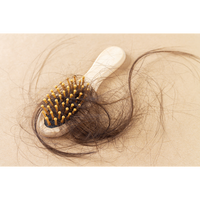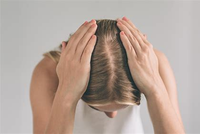Post-dengue hair loss treatment and everything else to know

Dengue outbreaks are common in many parts of the world, and Singapore is unfortunately one of the hot spots with a significant number of cases every year.
Many of us may already be familiar with symptoms of dengue fever, which includes prolonged fever, severe headache, joint and muscle pain, rashes, nausea and vomiting, and mild bleeding.
You may even have heard about long-term side effects such as continuous joint and muscle pain after a patient recovers from dengue fever, but did you know that hair fall is also a post-dengue symptom that many experience?
What is dengue fever?

Before we go into detail about post-dengue hair loss treatments, let’s first understand what exactly is dengue fever.
Dengue fever is caused by the dengue virus and is transmitted through the bite of an infected Aedes mosquito.
After an individual is bitten by an infected Aedes mosquito, symptoms will usually develop after an incubation period of four to seven days.
There are four variants of dengue virus, which means it is possible to get infected up to four times. Typically, first-time infections are rather severe, particularly if the infected patient is a high-risk individual such as an elderly or someone with a pre-existing medical condition.
However, in up to 75% of infections, the infected person is actually asymptomatic. But this doesn’t mean that they won’t be subjected to post-dengue side effects such as hair loss.
What is post-dengue hair loss?

During and after recovering from dengue fever, many patients said that they notice their hair falling out gradually. These are usually individuals who haven’t experienced significant hair fall prior to this health episode and many are perplexed and worried when the side effect occurs.
Why does dengue fever cause hair loss?
Post-dengue hair loss is classified medically as a form of “telogen effluvium”. This is a type of hair loss caused by scalp disorder due to drugs, trauma, and stress.
There are many possible reasons that doctors have identified as to why dengue fever causes hair loss.
Our hair follicles, found under our scalp, contain many blood vessels, which transport essential nutrients to support hair growth.
During a dengue infection, the body is unable to supply sufficient nutrients to the hair roots, and the hair follicles have to tap on the nutrients stored within the hair follicles in the meantime. Once this supply is used up, hair follicles start to decline, leading to excessive hair fall.
Another reason could be due to the patient’s inability to care for his/her scalp during the time of recovery.
As prolonged fever is a prominent symptom and patients usually feel extremely weak and fatigued before they fully recover, many may give up on proper hair care, causing follicles to clog, and aggravating hair loss, especially if the patient is already susceptible to it.
Finally, anxiety and stress that the patient feels during and after infection can also have an effect on his/her scalp and hair health. Cortisol, also known as the “stress hormone” that’s produced when an individual faces stressful situations, is one of the culprits that can cause hair shedding.
How long does hair loss after dengue last
Post-dengue hair loss usually starts one to two months after you recover from dengue fever. Typically, it can last six to nine months, but there are patients who complain that its effect lasts even longer.
Post-dengue hair loss treatments
Add hair-growing nutrients to your diet

To replenish the nutrient supply to the blood vessels in your hair follicles, load up on nutrients that are known to support hair growth such as iron, vitamin C, omega-3 fatty acids, and biotin.
These nutrients can be found naturally in foods such as broccoli, salmon, eggs, walnuts, and grains.
Increasing intake of these nutrients don’t just help strengthen hair, support hair growth, and prevent hair fall, they are also great for replenishing your nutrients to improve your overall health after recovering from dengue fever.
Start taking a hair supplement

Did you know that our hair is the fastest growing tissue in our body? This is why it needs a lot of nutrition in order to flourish.
The pesky problem is that our hair is also considered a non-vital part of our body so nutrients from our regular diet are typically routed to core functions of our lungs, heart, liver, and other major organs first, before going to our hair.
So while it is still important to adopt a healthy diet, taking in foods that we mentioned in the previous pointer, the nutrients that you consume may not be directed towards your hair eventually.
A good way to ensure that you’re getting sufficient hair-growing nutrition is to start taking a hair growth supplement that contains essential nutrients that can boost your hair growth.
If you’re looking for a trusted hair supplement as a post-dengue hair loss treatment, MIRIQA® Hair is here for you.
Made with a proprietary blend of nutraceutical ingredients, MIRIQA® Hair has won several awards and has been featured on many well-known media platforms.
Ingredients used in the supplement are botanical for added safety and reduced side effects, and at the same time have been proven to work scientifically.
One of the key ingredients used in MIRIQA® Hair is the Saw Palmetto Berries. This botanical ingredient is known for inhibiting DHT, a hormone that damages hair follicles and causes hair loss.
MIRIQA® Hair also contains Tocotrienol and Tripeptide Collagen, which improve nutrition deficiencies – something that you’ll need after the dip in hair-growing nutrients when you’re going through dengue fever. On the other hand, Keratin Forte and Biotin are found in the supplement to strengthen structural building blocks essential for healthy hair and nails. These are especially important for individuals who are suffering from lower metabolism after falling sick for a while.
Those who have tried MIRIQA® Hair report positive results and have been making recurring orders for it. While results are usually seen after six months, there are users who say they have experienced positive results after three to four months.
If you’re looking for a clinic-exclusive post-dengue hair loss treatment, opt for MIRIQA® Hair Extra Strength.
This supplement is fortified with two other ingredients not found in MIRIQA® Hair: Curcumin Bio-max and KSM-66 Winter Cherry.
Curcumin Bio-Max is a proven ingredient that blocks DHT and activates hair stem cells to transit from resting (telogen) to growing (anagen) phase.
KSM-66 Winter Cherry, on the other hand, strengthens your resistance against stress as it has the ability to reduce cortisol (stress hormones) levels. This is an ingredient that addresses the problem of stress after recovering from dengue fever; something that you don’t typically find in regular hair supplements.
You’ll be happy to know that thousands of users who have tried MIRIQA® Hair noticed positive results. Results are usually seen after six months, but there have been users who say they started seeing hair growth results after just three to four months. The results, of course, vary according to an individual’s condition and genetics.
100% drug-free MIRIQA® Hair is generally safe for everyone above 18 years old to consume. Nonetheless, check with your doctor if you’re concerned about allergies or conditions you’re unsure about, before consuming any supplements.
Avoid processes that damage hair

If you started noticing post-dengue hair loss, it’s time to avoid adding more damage to your hair.
This means to stay away from chemical processes on hair until your hair condition improves. This is because processes such as perming, bleaching, and hair dyeing can cause hair loss.
Put away your heat devices like your hairdryer, curling irons, and straighteners for a while too, to avoid weakening your hair shafts, which can lead to easy breakage.
Adopt stress-management activities

As stress is one of the causes of post-dengue hair loss, managing it will be one of the post-dengue hair loss treatments to consider.
Cut yourself more slack in the months after your recovery and indulge in hobbies that relax you. Whether it’s yoga, painting, or cafe-hopping with friends, these stress-reducing activities can certainly help reduce your cortisol levels, which can help support hair growth.
Keep up with your hair care routine
If you have been neglecting your hair care routine during your recovery period, it’s time to step it up.
Start by using a suitable shampoo and conditioner and wash your hair at least once a day. Include a scalp scrub if you want to enhance your routine; this helps get rid of impurities that clog your hair follicles. Remember, a clean scalp is a healthy scalp.
A scalp massage that you can learn and do it yourself at home can also improve blood circulation, helping your blood vessels route nutrients through the blood to your hair follicles.
Conclusion
While dengue fever can indeed have a detrimental effect on your hair, there are several methods you can try to reduce hair loss, keep your scalp healthy, and even encourage hair growth.
If you need more tips on boosting hair growth, check out our articles where we share about hair loss treatments in Singapore that are medically proven to work and how to choose a hair supplement that works for you.





